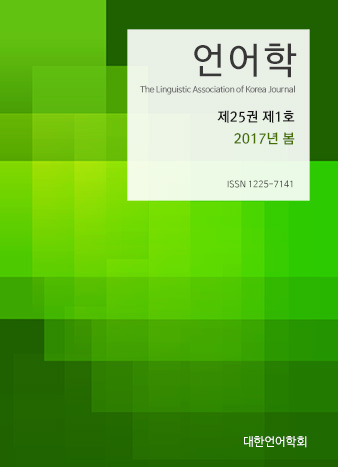대한언어학회 전자저널

-
Why is the Locative NP in Kiswahili not Syntactically Oblique?
-
Developmental Errors in Chinese L1 Speakers’ Use of the L2 English Past Tense and Perfective Aspect
-
An Exploration of High School Reading Test Items Based on Discriminant Analysis
-
Marketization of University Brochures in Korea and the US: From a Genre Analysis Perspective
25권 1호 (2017년 3월)
- Verbal Reflexive as a SELF Anaphor in Ho
-
Taejin Koh & Dohun Kim
Pages : 55-73
Abstract
Keywords
# detransitivitizer # SELF anaphor # predicate-centered reflexivity # verbal reflexive # condition R
References
- Burrows, L. (1915/1980). The grammar of the Ho language. New Delhi: Cosmo.
- Chomsky, N. (1981). Lectures on government and binding. Dordrecht: Foris.
- Cole, P., & Sung, L-M. (1994). Head movement and long distance reflexives. Linguistic Inquiry, 25, 355-406.
- Deeney, J. (1966). An introduction to the Ho language. Bihar: Xavier Ho.
- Haegeman, L. (1994). Introduction to government and binding theory. Oxford: Blackwell.
- Lidz, J. (2001). Condition R. Linguistic Inquiry, 32, 123-140.
- Mayuri, J., Subbarao, K., Everaert, M., Maheshwar, R., & Uma, G. (2014). Some Syntactic Aspects of Lexical Anaphors in Select Munda Languages. Mon-Khmer Studies, 43(1), 72-83.
- Ramamurthy, G. (1931). A manual of the Sora (or Savara) language. Madras: Government Press.
- Reinhart, T. (1983). Anaphora and semantic interpretation. London: Croom Helm.
- Reinhart, T., & Siloni, T. (2004). Against the unaccusative analysis of reflexives. In A. Alexiadou, E. Anagonstopoulou & M. Everaert (Eds.), The unaccusativity puzzle: Studies on the syntax-lexicon interface (pp. 159-180). Oxford: Oxford University Press.
- Reinhart, T., & Reuland, E. (1993). Reflexivity. Linguistic Inquiry, 24, 657-720.
- Rizzi, L. (1986). Null objects in Italian and the theory of pro. Linguistics Inquiry, 17, 501-558.
- Subbarao, K. V. (2001). Syntactic typological and South Asian languages. In R. Singh (Ed.), The yearbook of South Asian languages and linguistics. (pp. 93-108). New Delhi: Sage.
- Koh, T. (2009). A Typological Grammar of Ho. Seoul: HUFS Press.